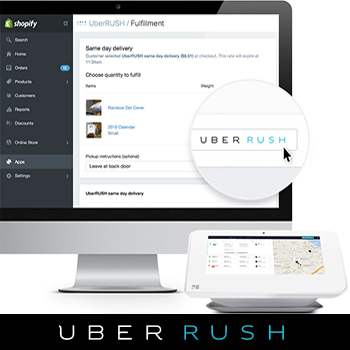For a little over a year, Uber has been operating its UberRUSH delivery service as a pilot program in New York City.
Today it’s making it an official part of the company, and expanding the courier service to Chicago and San Francisco, allowing customers to receive deliveries from local businesses.
UberRUSH competes directly with Postmates, delivering items like groceries, take-out food, and house supplies, albeit with a much larger fleet of cars on the road.
But unlike Postmates, when you open the Uber app, you won’t be flooded with a number of businesses that can deliver something to you.
While companies can take advantage of the expanded UberRUSH area of operations through the merchant platform, users won’t see any visible changes in the app, other than a new UberRUSH icon (for those in Chicago and San Fransisco) that will let you order a courier to deliver an item.
“Postmates is building a marketplace. We see this more as a logistics infrastructure,” Jason Droege, head of UberEVERYTHING told TechCrunch.
“Uber isn’t valued at more than $50 billion because it’s a ‘taxi app,’ but because investors see Uber as a logistics company.”
- Adrian Gonzalez, president of consulting firm Adelante SCM
Some merchants will UberRUSH deliveries when checking out, and some merchants may just supplement their own delivery fleet with Uber’s offering when things get busy.
Uber has integrated its delivery service with a number of top e-commerce platforms used by small businesses like Shopify, Clover, ChowNow, and delivery.com, which should help increase the number of local companies that utilize UberRUSH.
While it’s still early in the game for UberRUSH, the possibilities for Uber to truly succeed as a full-fledged delivery service are readily available.
With a fleet of cars that far exceed those operated by Postmates and Seamless, Uber could feasibly cut down on delivery times.
But with Amazon Prime Now still expanding and a number of other delivery startups sure to pop up in the future, UberRUSH is far from the last entry into this market.
Source: The Verge
Related: New Crowdsourced Delivery Models Pose Serious Challenges to UPS, FedEx, and USPS Monopolies

Article topics
Email Sign Up

















